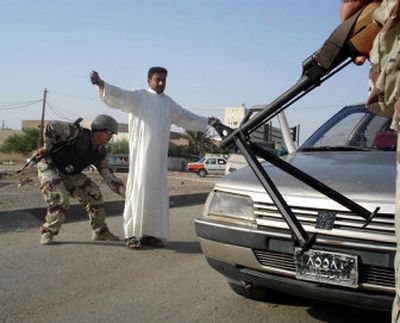Iraqi militias threaten south

BAGHDAD, Iraq – The intensifying battle between Iraq’s strongest Shiite militias – the Mahdi Army and Badr Brigades – threatens to destabilize Iraq’s oil-rich south and compound chaos in the capital. The outcome also could decide whether Iraq stays whole or breaks up.
The militias have become the largest security threat to a country already rocked by more than three years of attacks by Sunni Arab insurgents on U.S. and Iraqi forces and the Shiite population.
Despite repeated vows to crush the militias, Prime Minister Nouri al-Maliki has resisted U.S. pressure to move against the groups and their roaming death squads because he draws most of his support from the politicians who run them.
The Mahdi Army and Badr Brigades have repeatedly clashed since the 2003 overthrow of Saddam Hussein, most recently in the southern city of Amarah. Mahdi militiamen briefly took control of the city last week and fought gunbattles with the Badr Brigades-dominated police that killed 31 and wounded dozens.
“That was the worst time we had to go through in the city,” said Abdul-Hussein Adnan, a 37-year-old teacher from Amarah. “Given the high number of casualties and the tribal nature of the city, I expect things to get worse. It’s impossible in Amarah for someone to be killed and his killers not hunted down and killed in revenge.”
In Basra, Iraq’s second-largest city and the major southern metropolis, tensions between the two armed Shiite groups simmer constantly, occasionally breaking into conflict.
The militias also have a long history of suspicion and mistrust in the Shiite holy city of Najaf.
Last year, Badr Brigades supporters burned part of the Najaf offices used by the Mahdi Army and its leader, radical anti-American cleric Muqtada al-Sadr. Mahdi militiamen retaliated across the south by sacking the offices of the Supreme Council for the Islamic Revolution in Iraq, the country’s largest Shiite party which has the Badr Brigades as its military wing.
SCIRI officials have deep ties to Iran, where many of them spent years in exile during Saddam’s rule.
Although enmity between the two militias dates to the 1990s, it is now rooted in the desire of their political sponsors to dominate Iraq’s Shiite community. They focus particularly on the Shiite heartland south of Baghdad, a region stretching over nine provinces that is home to Iraq’s holiest Shiite shrines in Najaf and Karbala and much of the country’s oil wealth.
The rivalry could shatter the unity of the Shiite community at a time when many of its members feel threatened by the Sunni Arab-led insurgency and are alarmed by what they see as a gradual shift of U.S. support away from them and toward Sunnis. The Sunni Arab minority oppressed the Shiite majority for decades before Saddam’s ouster.
A Shiite official who has regular contact with Grand Ayatollah Ali al-Sistani, Iraq’s top Shiite cleric, said al-Sistani was discreetly trying to defuse tensions between the Badr Brigades and the Mahdi Army.
“His eminence does not want to see Shiite-Shiite fighting because the only losers will be the Shiites themselves,” the official told the Associated Press on condition of anonymity.
The Badr Brigades is seldom mentioned when the United States calls for al-Maliki to disband armed groups, perhaps because the Americans still see the militia’s political leadership as a center of power that can be swayed to U.S. policy goals.
Created in Iran in the 1980s and once headed by SCIRI leader Abdul-Aziz al-Hakim, Iraq’s most powerful politician, the Badr Brigades is suspected of assassinating Saddam loyalists, senior members of his outlawed Baath Party and Sunni figures suspected of supporting the insurgency.
Better organized than the Mahdi Army, tightly knit and secretive, the Badr Brigades is thought to have largely stayed away from the wholesale sectarian killings blamed on the Mahdi Army since the bombing of a revered Shiite shrine in Samarra last February.